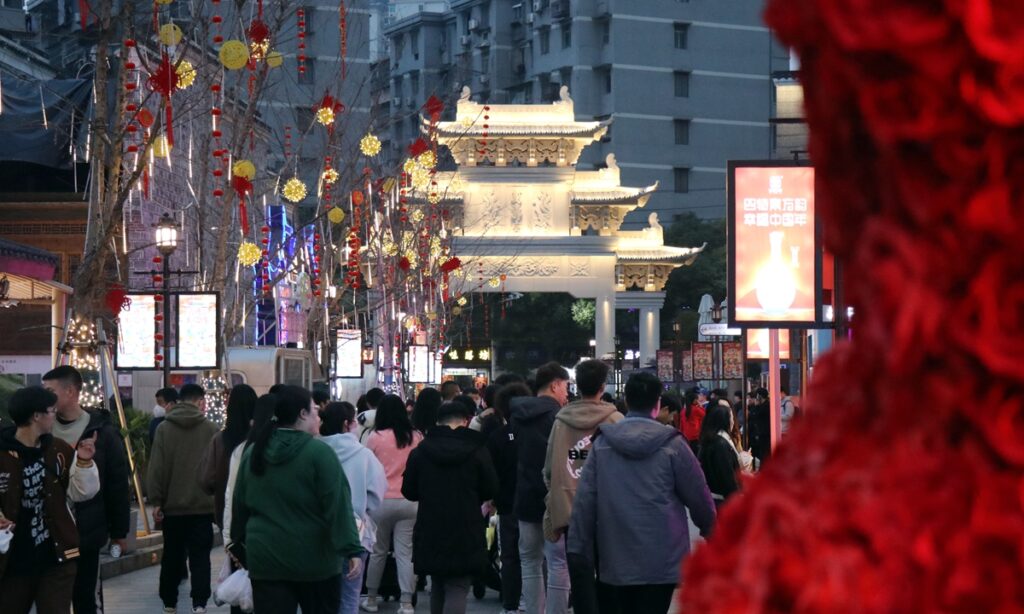As various socioeconomic development goals were determined at the just-concluded two sessions and government officials across the country are moving swiftly to implement relevant policy measures, expectations are growing within China and around the world that China’s economic recovery will continue to strengthen.
Despite growing signs pointing to a robust recovery in the world’s second-largest economy, some foreign media outlets have been cherry-picking certain monthly economic figures to hype claims of a worse-than-expected recovery pace in consumption and the so-called concerns of deflation.
Such claims are baseless and such concerns are unwarranted, Chinese economists said on Tuesday, while pointing to growing signs of China’s robust economic recovery and swift actions by central government departments and local governments to implement policies set at the two sessions to stabilize growth, prices and employment.
China is slate to release, on Wednesday, a set of economic data for the first two months of 2023, including retail sales and industrial output. Many are expecting strong figures showing China’s accelerating economic recovery. Bloomberg, for example, reported on Tuesday that all of the figures “are expected to show a rebound from December,” citing a gradual recovery in consumer spending and confidence.
Hu Qimu, deputy secretary general of the digital-real economies integration Forum 50, also suggested that February’s data will provide more signs of China’s economic recovery. “On a year-on-year basis, [the figures] will look better than that during the same period last year,” Hu told the Global Times on Tuesday.
Some economic indicators for February have already reflected a solid economic recovery. For example, China’s manufacturing purchasing managers’ index (PMI), which tracks factory activity, shot up to 52.6 in February, hitting the highest level in over a decade. Also, China’s exports fell 6.8 percent year-on-year in the first two months, but it still beats expectations of a 9.4 percent fall by some foreign institutions.
However, despite the stream of improving signs, some foreign media also seized on some indexes to hype negative sentiment about China’s economic recovery. Most notably, China’s consumer price index (CPI), a main gauge of inflation, rose 1 percent year-on-year in February, which is down 1.1 percentage point from the growth in January. On a monthly basis, the CPI dropped 0.5 percent.
The slower CPI growth was widely cited as a sign of slower-than-expected recovery in consumption. “The figures were tinged by doubt on the robustness of China’s consumption rebound,” a Reuters article asserted, while asking in the headline “Is China exporting deflation?”
Concerns of deflation, which describes a sustained fall in the general price level, have also been hyped by posts on some Chinese social media platforms.
“Such assertions have no factual basis and are misleading by turning monthly price drops to deflation,” Hu said, “Foreign media have been hyping the assertion that China’s demand is insufficient, which leads to lackluster economic recovery, and that there is a lack of confidence in the market… But the reality is that consumption during the Chinese New Year recovered to at least 80 percent of pre-pandemic levels.”
Some foreign media outlets have also seized on a decline in car retail sales in the first two months of 2023 and price cuts by carmakers to boost sales to hype claims about the slower-than-expected recovery in consumption. Significant discounts offered by Dongfeng Motor Corp based in Central China’s Hubei Province in cooperation with the Hubei provincial government have particularly gained attention.
“This is just normal corporate discount and promotional activity, which is within a reasonable range” and is aimed at destocking older car models, Cui Dongshu, secretary general of China Passenger Car Association, told the Global Times on Tuesday. “With the full recovery of consumption, we are confident that the consumption in the auto industry this year will be better than last year.”
Swift actions
According to this year’s Government Work Report delivered to the opening meeting of the first session of the 14th National People’s Congress, China will aim for a GDP growth of around 5 percent in 2023 and a CPI increase of around 3 percent. Noting that the foundation for stable growth needs to be consolidated and insufficient demand remains a pronounced problem, the report said, “We should give priority to the recovery and expansion of consumption.”
Given the economic and social development signs and specific policy measures outlined during the two sessions, many economists are expecting swift actions from officials to boost consumption in order to stabilize growth.
“After the two sessions, with many major targets including growth expectations having been released, the focus now should be on measures to support consumption, investment and imports and exports,” He Weiwen, a senior fellow at the Center for China and Globalization, told the Global Times on Tuesday.
Reflecting the impressive efficiency of the Chinese government, many central government departments as well as local governments across the country have already started to hold meetings on implementing policy priorities set at the two sessions, which concluded on Monday morning.
During a meeting on Monday, the China Banking and Insurance Regulatory Commission vowed “all efforts to promote the continuous improvement of the national economy, and give priority to supporting the recovery and expansion of consumption,” according to an official statement.
At a meeting on Tuesday, Chen Jining, Party chief of Shanghai, said that priority will be given to boosting confidence and stabilizing expectations, and the city will also continue to expand investment, boost consumption and stabilize foreign trade.
“The general focus this year is to first achieve significant improvement in quality. Restoration of the economy must be in line with the laws of economic recovery, and we should pursue long-term stable recovery rather than a short-term boost. It is hoped that a stable recovery trend will be maintained throughout the year and the growth target of around 5 percent will be achieved,” Hu Qimu said.
(Global Times)




